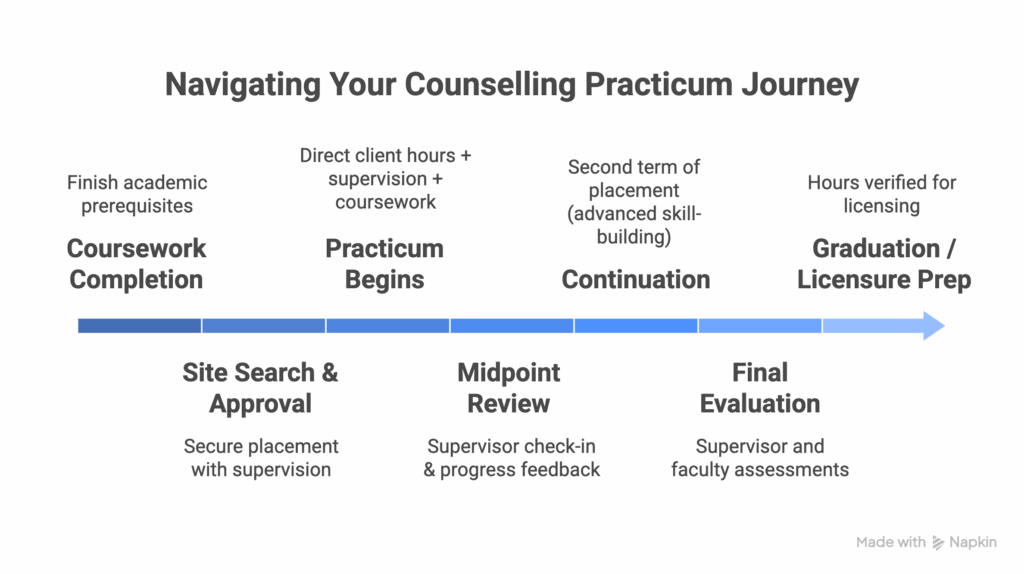
A counselling practicum is a supervised, hands-on learning experience where students apply their academic knowledge in a real-world clinical setting. It’s an essential component of most master’s-level counselling psychology programs, and often a key requirement for professional licensure.
In this blog, you’ll learn why a practicum is a vital step in becoming a therapist, what kind of work it typically involves, how supervision supports your growth, and the ways it can influence your career path.
1. Why Is a Counselling Practicum Important?
The practicum is where your classroom learning becomes lived experience. For most students, it’s the first time they sit across from a real client, not a case study or a classmate pretending to need help.
But more than just ticking a box on your degree, a counselling practicum serves three core purposes:
- Skill Development: It allows you to build foundational counselling skills like active listening, empathy, and ethical decision-making, in a structured environment.
- Professional Readiness: It prepares you for what it’s really like to work in mental health, with all the complexity and responsibility that entails.
- Licensure Requirement: In Canada, most regulatory bodies require a supervised practicum to qualify for licensure or certification as a counsellor or psychotherapist.
In short, the practicum is not just important, it’s indispensable.
2. What Happens During a Practicum?
A typical counselling practicum involves:
- Direct client work: Conducting therapy sessions (individual, couple, or group), often under observation or review.
- Case documentation: Writing clinical notes, developing treatment plans, and assessing progress.
- Weekly supervision: Meeting regularly with a qualified supervisor to review sessions, receive feedback, and reflect on your development.
- Integration of theory: Applying concepts like cognitive behavioural therapy (CBT), trauma-informed care, or family systems theory in a practical context.
- Ethics and boundaries: Navigating real-world dilemmas, confidentiality, and professional responsibility.
It’s intense. It’s challenging. And it’s designed to be transformative.

3. Where Does the Practicum Take Place?
Practicums typically take place in community mental health clinics, private practices, schools, hospitals, or non-profit organizations. The key is finding a site that offers a diverse range of client experiences and aligns with your interests.
Some programs assign placements. Others, like Yorkville University’s MACP, allow students to identify and secure their own sites with robust support from faculty. This gives you more control over your experience and a better fit for your long-term goals.
4. Supervision: Who Guides You?
Supervision is at the heart of any practicum. You’ll work closely with an experienced mental health professional, usually a registered psychotherapist, psychologist, or clinical counsellor, who meets your program and regulatory requirements.
Their role is to:
- Observe and evaluate your sessions (either directly or through recordings)
- Provide constructive feedback and mentorship
- Ensure client safety and ethical standards
- Help you grow in confidence and competence
Good supervision can make or break your practicum experience. It’s one of the reasons students are encouraged to seek placements with qualified, supportive supervisors who are invested in their growth.
5. How a Practicum Shapes Your Career
Aside from helping you graduate, a strong practicum can open professional doors. It might:
- Lead to a job offer at your placement site
- Help define your niche, whether that’s trauma counselling, youth therapy, or couples work
- Build your clinical hours for licensure as a Registered Psychotherapist or Certified Canadian Counsellor
- Grow your professional network, including supervisors, colleagues, and future references
78% of Yorkville University’s MACP students have discussed potential employment opportunities with their practicum site supervisors, a clear sign of how impactful this stage can be in launching your career.
6. Why Yorkville’s Practicum Experience Stands Out
While many Canadian universities offer practicum experiences, Yorkville University’s Master of Arts in Counselling Psychology (MACP) program offers one of the most robust practicums in Canada.
Here’s how Yorkville sets itself apart:
- Robust Practicum Support: From faculty mentorship to practicum advisors, students receive one-on-one support throughout the placement process. You’re not left to navigate it alone.
- Canada-Wide Reach: Because it’s a national program, Yorkville students complete practicums in communities across Canada—urban, rural, and remote.
- Real-World Relevance: Practicum placements are tied closely to Yorkville’s applied, competency-based curriculum. What you learn in class directly informs what you do on site.
- Licensure Preparation: The program is structured to meet educational requirements for most provincial licensing bodies, including CRPO and CCPA.
If you’re looking for a program that understands the real-world needs of today’s students, and tomorrow’s counsellors, Yorkville’s MACP practicum is worth serious consideration.
7. Final Thoughts
The counselling practicum is where everything you’ve learned starts to feel real. It’s where uncertainty turns into clarity, and where aspiring therapists start to see the kind of professional they want to become.
Whether you’re just starting to explore counselling programs or preparing for your own practicum, remember this: the right practicum experience can shape your entire career.
And if you want a program that supports you every step of the way, before, during, and after your practicum, Yorkville University is built for you.
Ready to learn more?
Check out Yorkville University’s Master of Arts in Counselling Psychology and take the next step toward becoming a confident, competent, and licensed mental health professional.






